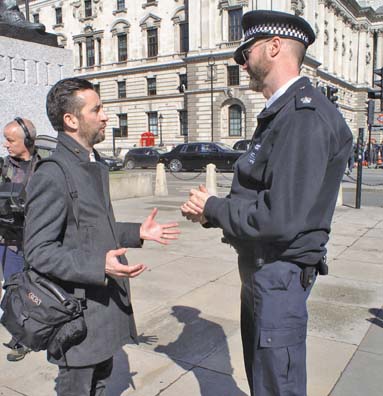Arising from the publication yesterday afternoon of the first of three reports by the Manchester Arena Inquiry – the first being about the Arena’s security – the BBC News Channel broadcast last night (to be repeated tomorrow and Sunday) a half hour documentary, Security in the Spotlight. Mark Rowe watched it.
The most telling point in the documentary was from one of the witnesses that has given evidence during the ten months of the Inquiry so far; a member of the public who found the someone so suspicious with his back-pack, by himself in the City Room, the foyer outside the Arena concert hall proper – as the Inquiry established, a ‘blind spot’ for the site’s CCTV – that the member of public spoke to what we know now was the suicide bomber. That man’s replies were so unsatisfactory that the member of public – and here is the crucial point – went to look for a policeman to report to. The member of the public did not find one, and spoke instead to a uniformed Showsec contract teenager.
That member of the public’s instinct was that a suspicion of terrorism was a matter for the police; and at second best, for a non-police uniformed person. In that sense, the title of the documentary was inaccurate. The documentary presenter, the BBC News north of England correspondent Judith Moritz, gave another crucial piece of evidence from the Inquiry; an email from a British Transport Police (BTP) sergeant, that told his team beforehand that on the night of the suicide bombing, at least one of them should be in the City Room from 10pm; that is, on the eve of the Ariana Grande concert ending and the thousands of mainly young concert-goers exiting. To leave the documentary for a moment, as the Inquiry report stated, ‘there were no BTP officers in the City Room during the period 22:00 to 22:31’, the minute the bomb detonated. As the documentary pointed out, those officers have since been commended.
However the documentary repeated what the BBC1 Six O’Clock news did: at 6pm the news named two Showsec teenagers, and showed from Victoria Station CCTV but named none of those BTP police; while the documentary named one of the teenagers, but again showed CCTV but otherwise did not identify any of the BTP.
Interviewed for the documentary was Jon Lavery, who gave evidence to the Inquiry as a former 30-year policeman who was a Showsec superviser who worked at the Arena that month. The documentary posed the question of general security standards; how to tell (if you are in a pub, for example) that a place takes security seriously?
Also interviewed were the former senior Met Police and national counter-terror policeman Nick Aldworth; and fellow campaigner for a ‘Martyn’s Law’, Figen Murray, the mother of Martyn Hett, one of the 22 victims of the Arena bombing. Aldworth first described the 2017 act of terrorism as having ‘broken the mould’ in that the bomber targeted chlldren (in the Ariana Grande audience).
Aldworth featured in the May 2018 print edition of Professional Security magazine on the London-wide launch of the Project Servator counter-terror patrol method (and is pictured right, speaking to a member of the media on the launch morning in Parliament Square). Aldworth, who since retiring from the police has become a security consultant, said of the security industry: “I think there are pockets of excellence, there’s no doubt about that …. but on an equally, possible greater basis I see sub-standard security delivered.”
Figen Murray was quoted from her video diary that she has kept during the Inquiry. The documentary went on to describe Martyn’s Law, whereby a legal responsibility would be placed on venues (under the Home Office’s proposed ‘Protect Duty’ that has been widened, to retail, cinemas and the like, and public spaces from parks to beaches) for the security of people. Security, she said, ‘needs to be in the forefront of people’s minds’. And Aldworth was quoted saying that he thought the proposed law was ‘a generational opportunity; I can’t think of another piece of legislation that will change the security landscape so significantly, and I hope to dramatically’.
To read the 200-page, 60,000-word report, visit https://manchesterarenainquiry.org.uk/. The second and third reports are due to cover emergency response; and the security services.










